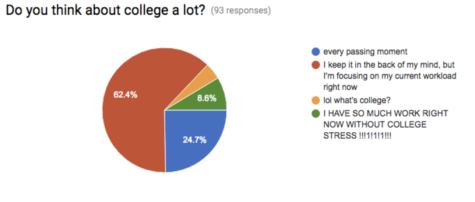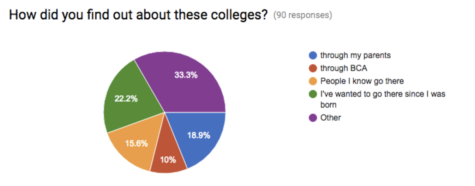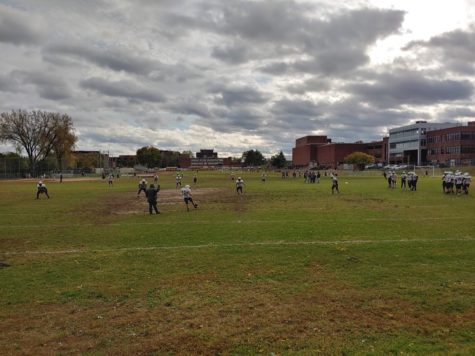Evolving College Perspectives at BCA
BCA pre-frosh (a name they have been endearingly dubbed) are like confused children trying to understand the ropes of BCA. Soon, these pre-frosh will walk the halls as freshman, and then they will graduate to the sophomore lockers in the basement. After even more stress, they will reach the dreaded junior year of the SATs and ACTS, as well as IBs and APs. By the time they become seniors, it’s no surprise they are considerably different from the pre-frosh they used to be. But one thing typically stays constant throughout these four years: a healthy fear (or excitement) for college.
The Chronicle was interested in finding out how students’ perceptions of college evolve over their high school career. We sent out a poll to all grades asking about what colleges they applied to, or want to apply to, and we found a very interesting trend. After talking to guidance counselors at BCA, Mr. Zurich (AAST) and Mr. Kaser (ABF), we gained more insight in BCA’s role in students’ college choices.
“They (freshmen) come in and have high aspirations, as we would expect- in order to get into a school like this, you should have aspirations.”
To begin, the freshman results revealed that 90% of the 41 freshmen who responded had at least 1 Ivy League school in their response and 17% chose all Ivy Leagues. This is a significantly high percentage, considering the extremely low acceptance rate of these colleges. However, Mr. Zurich, the head guidance counselor at BCA, pointed out that “they (freshmen) come in and have high aspirations, as we would expect- in order to get into a school like this, you should have aspirations.”
The sophomore results were similar: 89% of the 28 sophomores included 1 Ivy League in their response. But there is a significant drop between the results of the sophomores and the juniors. For the juniors, only 42% of the 24 that participated in the survey included an Ivy League. What experiences led to this significant drop? The Chronicle hypothesized that maybe this had to do with guidance seminars and college trips that BCA holds for sophomores and juniors.
“These trips are really designed to open students’ eyes to the fact that there are other schools out there where they can be happy, comfortable and get a great education.”
As many students know, BCA organizes college trips every year (this year, there was one to the Midwest and another into Boston) to expose students to different colleges. Mr. Zurich tells us that “these trips are really designed to open students’ eyes to the fact that there are other schools out there where they can be happy, comfortable and get a great education.” In fact, he stated that during the Boston college trip, students on his bus were extremely impressed with Northeastern and Boston University, although they also visited two of the highest ranked colleges-Harvard and MIT. It seems this stigma of only the top schools as being great is something that starts to fade away when exposed to other colleges.
After interviewing Mr. Zurich and Mr. Kaser, we found one underlying theme within their interviews; the Ivies are definitely not the only place to get a good education. After all, the term “Ivy League” refers only to a sports league- not to some type of secret society of geniuses. Both counselors emphasized that the priority for students should be finding their “bes
t fit” college, and Ivy Leagues might not fit that mold. There are a plethora of colleges that will provide students with a great education.
The senior results seem to the follow the trend of less Ivy Leagues in their top 3 picks of colleges. From the 24
responses, it was shown that only 24 out of the 72 colleges listed were Ivy League colleges; only around 33%! This number is significantly lower than that of the freshmen results; and overall the trend shows

an inverse relationship between the amount of Ivy Leagues students want to apply to and their grade level. In other words, it seems that students broaden their perspective and face reality when it comes to Ivy Leagues and college as they progress through high school.
To get some more insight about the senior’s perspective, we surveyed some seniors for advice to the underclassmen applying to college. Within the responses, many seniors advised to “stop defining your success by how recognizable the name of your college is…”. Reiterating what Mr. Zurich and Mr. Kaser said, they also emphasized the importance of finding the “perfect fit” college. Someone recounted their experience with applying to college, and said that they only knew the colleges their parents talked about at first. But when they started to research their own colleges in junior year, their “view of college changed and it felt like something more real.”
But for those out there struggling with the multitude of colleges to choose from and the pressure to enter a big-name one, just remember…
“It’s not about name recognition, it’s about a good fit for you.”

The circle graph on the left shows how much college influences underclassmen’s thoughts.
Hi! My name is Rachel Hur and I'm the editor-in-chief of the Academy Chronicle - I have been writing for the paper since my freshman year! I am currently...
Hi, my name is Maeve McFadden and I'm currently a senior in AAST at BCA. I've been a part of the paper for 4 years now and I love writing. In my free time,...



